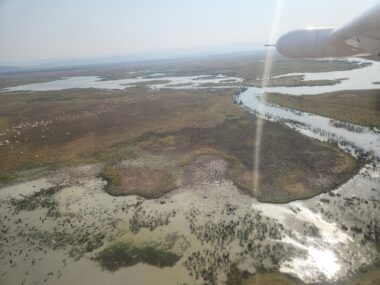A new report, Electric Savings: the case for NSW councils to reduce emissions and energy bills through electrification, based on modelling by Strategy Policy Research and commissioned by 350 Australia, shows that electrification could slash the energy bills and greenhouse gas emissions of newly built homes and businesses across NSW.
The report models how much money and emissions would be saved if councils in NSW required new homes and businesses to be fully electric from 2024.
As the cost-of-living crisis continues to impact renters, homeowners and small businesses, the report strengthens the case for electrification as a vital measure to lower living costs through reduced energy bills.
The report comes after the Albanese Government released its “Future Gas Strategy”, which would set the world on a path towards catastrophic climate change. The strategy has been roundly criticised by environment groups and energy experts.
The report finds that:
- Requiring new residential buildings to be fully electric from this financial year would save $608 per year on average over the next 40 years - a total of $7,900 per household and $5.3 billion across the state.
- Greenhouse gas emissions for newly homes across the state would be reduced by 90.6% over the same period.
- New commercial buildings, like schools, hospitals, offices, cafes, restaurants and shops, would save $6.5 million this financial year, totalling to $1.3 billion over the next 40 years.
- Greenhouse gas emissions for new commercial buildings would be reduced by 77% over the period.
Together, cost savings for both the commercial and residential sectors represent $6.6 billion dollars in reduced energy costs across the state. The report also shows that 39 million tonnes of greenhouse gas emissions would be avoided over the next 40 years if new homes and businesses were electrified, an 85% reduction on business as usual. This is the equivalent of taking 313,000 cars off the road every year for 40 years.
The report strengthens the case for councils to take leadership over the electrification of new buildings, since Premier Chris Minns abdicated responsibility when he poured cold water on the proposal for his government to follow Victoria and ACT’s lead in banning new residential gas connections.
Since December 2022, councils in NSW have taken matters into their own hands by passing planning laws that require new developments to be electrified, starting with Parramatta and Waverley Councils. Since then, another 10 councils have joined this community-led movement, including City of Sydney, Lane Cove, Newcastle, Hornsby, North Sydney, Inner West, Blue Mountains, Canada Bay, Ryde, and Canterbury-Bankstown Councils.
Lucy Manne, CEO at 350 Australia said, “Gas is a potent, fossil fuel that is accelerating the devastating impacts of the climate crisis like bushfires, extreme heat, floods and sea level rise. We need to end the age of fossil fuels now and we can start by eliminating toxic methane gas from our homes and local businesses.
“While the Albanese Government is determined to keep us addicted to toxic gas with their discredited Future Gas Strategy, more gas just means more pollution, and that means worse fires and floods. We can’t have a safe future and massive new gas projects. We can wean ourselves off gas by electrifying our homes and businesses with the technology that already works.
“This report shows that electrifying new homes is a win-win solution - it cuts energy bills for local residents and small businesses during a cost of living crisis and reduces climate pollution, at almost no cost to councils. It will be low-income people and renters who will benefit most from council-led electrification.
“We call on the NSW state government to follow Victoria’s and ACT’s lead in requiring new developments be fully electric. In the meantime, electrification requirements for new buildings is an effective, easy step for councils who want to join this community-led movement for cleaner, healthier homes.”
Bronwyn McDonald, NSW Campaigner for Healthy Futures, an alliance of health organisations said, "All-electric new homes and businesses not only reduce energy bills and climate pollution, they’re also better for our health.
It’s completely unjustified that governments still allow new homes, schools and hospitals to be connected to gas when doctors have told us for decades that gas is toxic for our health.
“To protect children, the elderly and people with respiratory medical conditions, health professionals call on governments to urgently phase out gas from homes, schools and hospitals.”
Joel Dignam from Better Renting said, “Higher energy costs are a challenge for everyone, especially renters who have little choice but to rent inefficient homes with expensive gas appliances. Having more all-electric homes will mean more options for renters and cheaper energy bills.”
In the report, avoided daily gas connection fees make up around 30% of the cost savings under the model, or $1.6 billion over the 40 year period. The remaining 70% of savings are energy bill savings.
The model takes into account the rate of new residential and commercial construction projections, as well as solar PV penetration rates based on the Australian Energy Market Operator’s Step Change Scenario outlined in its Integrated System Plan.
The model excludes biogas and hydrogen from the analysis, since no credible energy expert suggests these energy sources will be part of the energy mix at scale at any time in the near future due to a range of technical and economic barriers.
ENDS
View the Electric Savings report here.
The technical report can be viewed here.
Media contact:
Lucy Manne, 350 Australia, 0417 387 516 | [email protected]
Available for interview:
Lucy Manne, 350 Australia, 0417 387 516 | [email protected]
Bronwyn McDonald, Healthy Futures, 0408 477 403 | bronwyn.McDonald@
Joel Dignam, 0402 182 389, Better Renting, joel@betterrenting.


